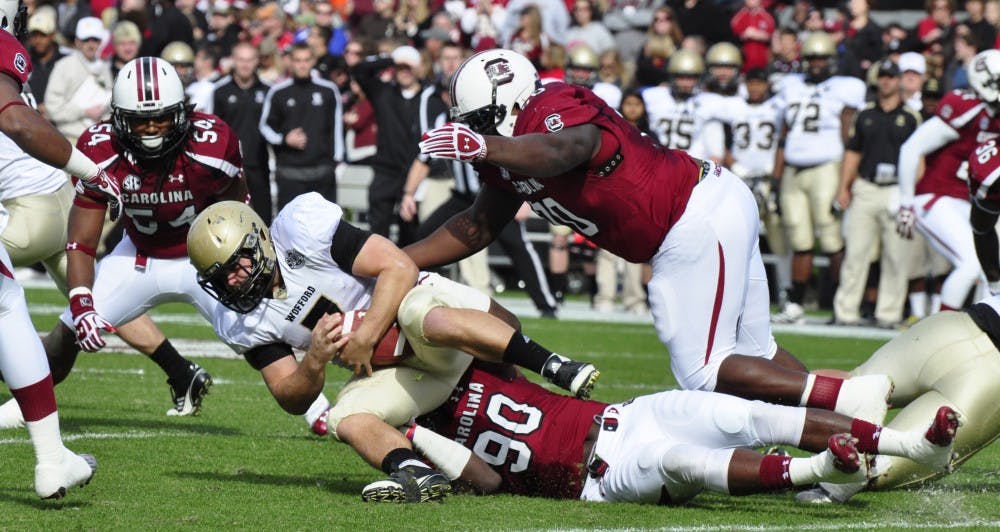UNC, Central Florida, Coastal, Clemson make up Gamecocks’ nonconference slate
South Carolina will travel to Orlando, Fla., this week to take on Central Florida. While the name may not strike fear into Gamecock fans’ hearts, they should be worried about the Knights.
UCF is coming off a win at Penn State, is 3-0 this season and is receiving votes in both major football polls.
The game will be a sellout, and the atmosphere is sure to be hostile, since the Knights don’t get visits from top-15 teams very often.
It will be the second nonconference game for South Carolina this season. The Gamecocks defeated Atlantic Coast Conference foe North Carolina to open up the 2013 campaign. The team has two nonconference games left, against Coastal Carolina and No. 3 Clemson.
Now let’s compare the Gamecocks’ nonconference schedule to those of a couple of other Southeastern Conference teams.
Texas A&M’s nonconference schedule includes Rice, SMU, UTEP and Sam Houston State, with all of those games at home.
Arkansas’s nonconference schedule consists of home games against Louisiana-Lafayette, Samford and SMU and a road game at Rutgers, which they lost this past week.
At least the Razorbacks went on the road, right?
The fact of the matter is that many teams across the country benefit from cupcake nonconference schedules. It has gotten better over the last few years with the creation of the Chick-fil-A kickoff and the Cowboys Classic.
Those matchups pit highly touted teams from different conferences against each other.
Remember when, before those two games, opening week was a collection of 70-0 blowouts against Football Championship Subdivision teams?
Thankfully, things have improved, but there are still too many blowouts and incredibly uneven games. (See Louisville and Florida International and Ohio State and Florida A&M.)
It’s perfectly understandable to have one automatic win on the schedule. South Carolina routinely plays an in-state FCS team as one of its nonconference games. This season, that opponent is Coastal Carolina.
Playing these games is a good payday for smaller schools and a great opportunity for players to get a taste of big-time football.
But when you have three or more games like it in a season, it becomes ridiculous.
It is bad for both the school and its fans. I don’t care if you’re a die-hard fan; it is just impossible to get as excited for a game against Austin Peay as you would for a game against a school from one of the six major Football Bowl Subdivision conferences.
Plus, with the Bowl Championship Series ending (thankfully) next season, the teams with impressive nonconference wins are going to be getting more votes than the teams that are playing soft teams every week once the four-team playoff starts up.
Speaking of scheduling…
As I was sitting down watching football over the weekend, I found myself wondering, “What the heck is GameDay doing in Fargo, N.D., and why are Michigan and Connecticut playing on Saturday Night Football?”
Well, a quick glance at the matchups last week tells the story. There was a desperate lack of quality games across the nation. The only game that pitted ranked teams against each other was No. 23 Arizona State at No. 5 Stanford, where the Cardinal rode a 29-0 halftime lead to an easy 42-28 victory.
The NCAA needs to do a better job of spreading good games throughout the season. I understand you can’t forecast how good teams will be halfway through the season, but I’m sure there is some way to make sure that the featured ESPN night game is better than Auburn at LSU on a weekly basis.

